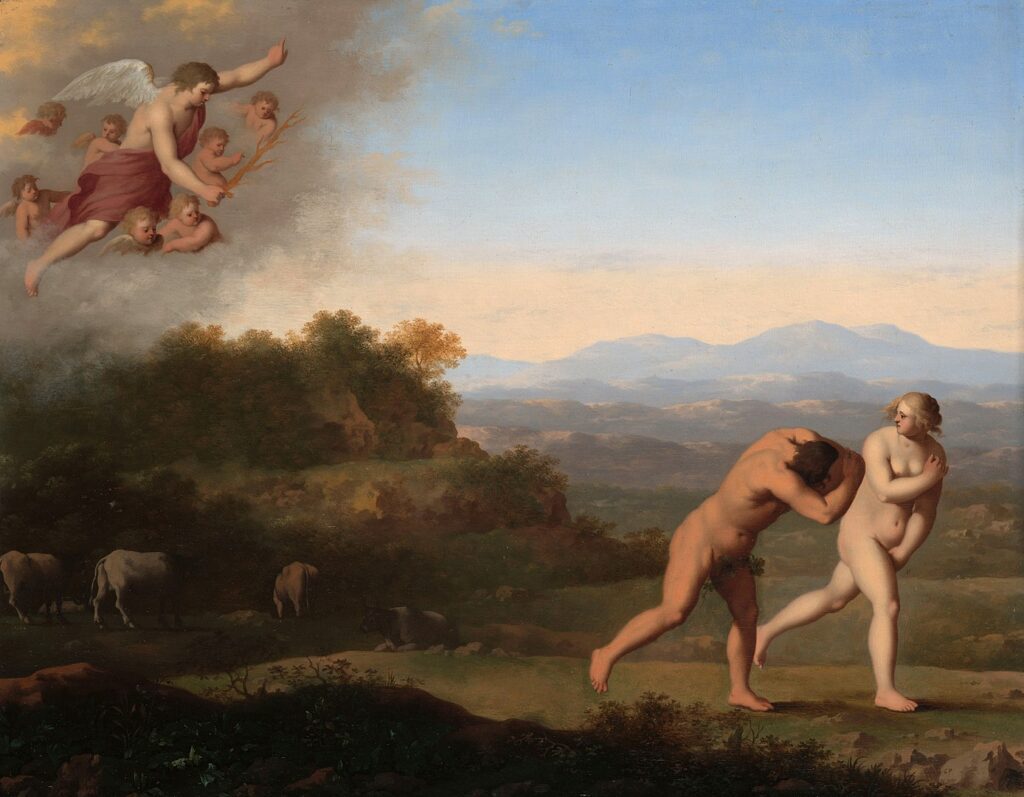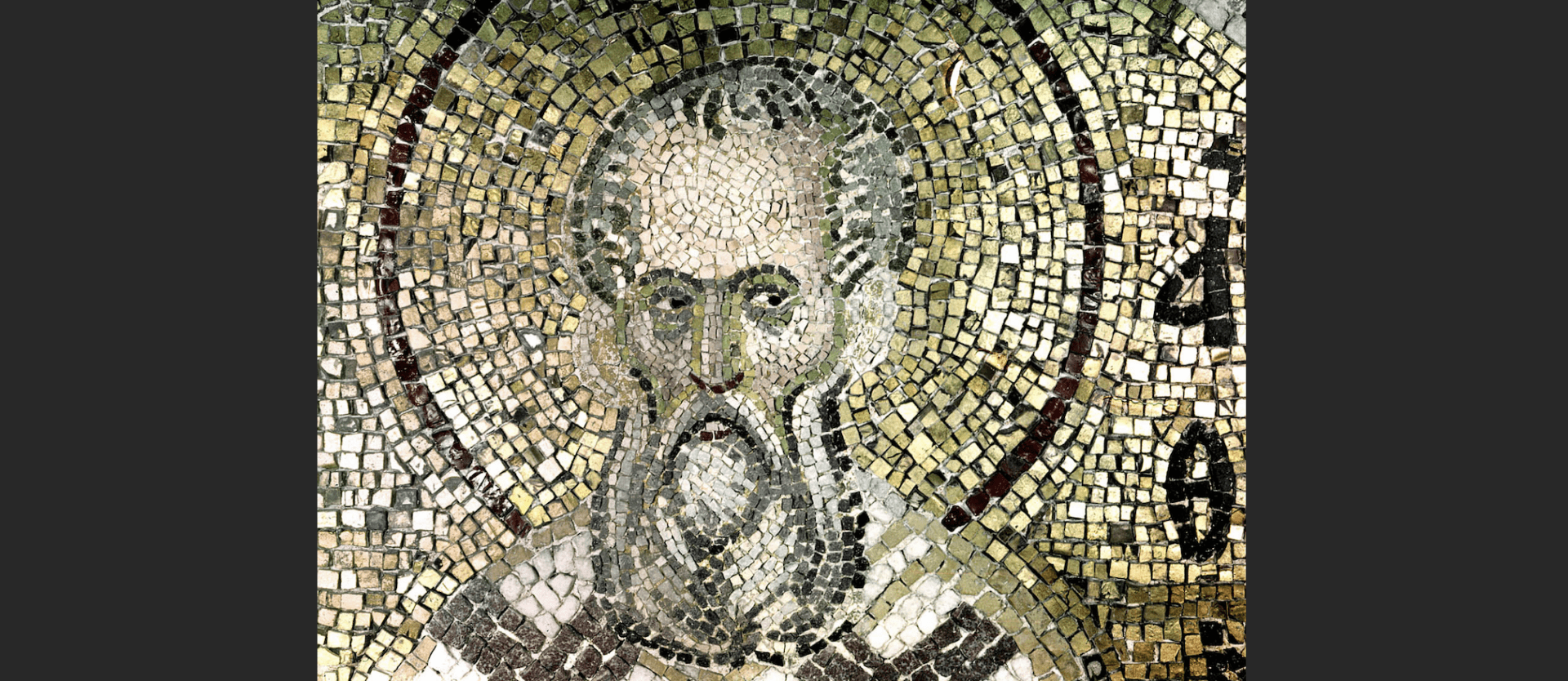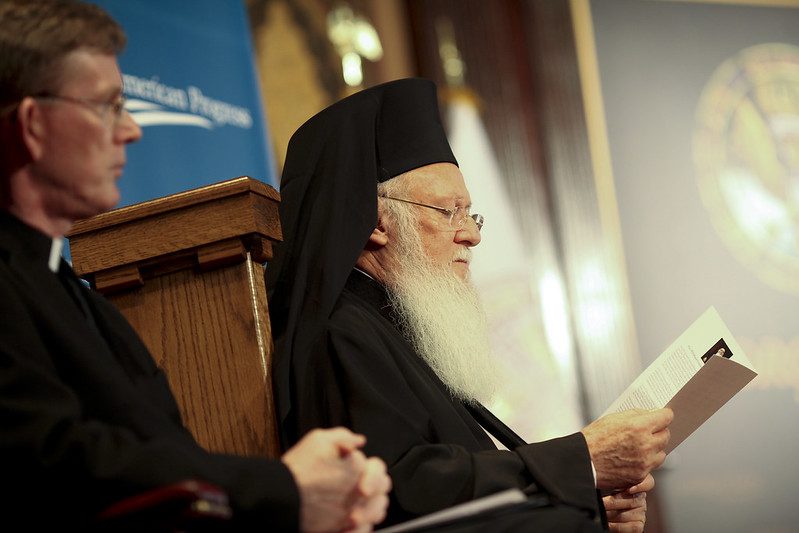“In the beginning was the Word, and the Word was with God, and the Word was God…. And the Word became flesh and dwelt among us” (John 1:1,14). “To those who did accept him he gave power to become children of God” (John 1:12). By God’s own glory and power, “you may come to share in the divine nature” (2 Peter 1:4).
If the above quotes of Scripture could be given in a simple summary, what would it say? It would say exactly what St. Athanasius said just before the Ecumenical Council of Nicaea in 325. He said, “The Son of God became man so that man might become God [by grace]” (Catechism of the Catholic Church [CCC], 460).
Why the Surprise?
Writing jointly with Russell Shaw, the moral theologian Germain Grisez once wrote, “The idea of our divinization is so astonishing, and so different from anything we ordinarily think that we tend to cast about for ways to weaken its force by giving it an attenuated meaning. That empties Christianity itself of meaning” (Fulfillment in Christ, 283). Have we emptied St. Athanasius’s saying of its meaning? Are we too busy trying to tone it down because of the effort involved in taking time to explain it properly? Will we let it mean what he understood it to mean? After all, Athanasius is the one who almost single-handedly saved Christianity from abandoning the Apostolic understanding of the Trinity when Arius tried to sway bishops away from following the Council of Nicaea. The Athanasian kerygma (key proclamation of the Gospel) is a powerful statement that restores the real mystery of Christianity, a mystery that must be lived to be understood.

Most Christians never re-appropriate the Christian Faith at a mature level. St. Paul speaks of this phenomenon when he says, “I fed you milk, not solid food, because you were unable to take [the fuller meaning]” (1 Corinthians 3:2). Usually, answering their adult questions with childish answers and understandings, Christian adults and teens lose the faith and become only Christian in name or neo-pagans. They believe they have overcome childish beliefs when in fact they are only rejecting childish presentations of the faith from childhood. This is all the more true of Catholic Christians who were most often only “fed milk” in Catholic schools and often never got the “meat and potatoes.” The objective of this brief essay is to help them and Christians caught in solely legalistic understandings of justification (how God redeems our souls and makes us holy) to recover an authentic understanding of the faith and maintain its mystery and beauty.
By not getting too technical, it is hoped we will avoid attenuating Athanasius’s meaning. Nevertheless, his statement is so foreign to so many who view Christianity as only a matter of avoiding sin that we need address their concerns about what “becoming God” means and what it does not mean. We need to use real authorities in the Christian West who will help alleviate their concerns. After all, are we implying that we become identical in every way with God? Was it not the sin of the devil to want to become God?
The Son of God became man so that man might become God [by grace].
–St. Athanasius
In an effort to help Christians love God with St. Athanasius, we will use the major theologians in the West who the Catholic Church declared to be Doctors; the main theologians who should be trusted for their explanations in a given subject area. St. Thomas Aquinas (the Angelic Doctor), who relied heavily on the theology of St. Augustine, will address concerns that such desires to “become God” led to the sin of the devil and will lead Christians astray. St. John of the Cross (the Mystical Doctor) will address objections that “becoming God” sounds New Age-ish and as if we will lose our humanity and personal identity in some kind of Nirvana.
Answering Concerns
In his Summa Theologica, St. Thomas Aquinas (the Angelic Doctor) does teach that the sin of the devil was that the devil desired to become God (STh I, 63, 3). However, Aquinas makes clear in this same section (Question 63, Article 3) that this is a sin according to one fashion, but not according to another. An expert on the Sacred Scriptures and the Church Fathers, Aquinas makes very clear there is no sin in desiring to be God “provided that [one] desires such likeness in proper order, that is to say, that [one] may obtain it of God. But [one] would sin were [one] to desire to be like God even in the right way, but of [one’s] own power, and not of God’s.”
The sin of the devil was according to this second fashion: “He desired as the last end of his beatitude something which he could attain by the virtue of his own nature, turning his appetite away from the supernatural beatitude which is attained by God’s grace. Or, if he desired as his last end that likeness to God which is bestowed by grace, he sought to have it by the power of his own nature, and not from divine assistance according to God’s ordering.” Aquinas ends by summarizing St. Anselm who says “that [the devil] sought that to which he would have come had he stood fast.”
Growing into the true likeness of God and beginning to share in God’s own power (eternal life) comes from God as a gift.
In other words, according to Anslem and Aquinas, Lucifer could have “become God” by participation in the divine nature if the devil had done it God’s way instead of trying to take the gift by his own power! God is love, not raw power and force. Love is received, not taken. Love is given freely, not taken by force. One cannot use force to become God who is love. We have no power over God. One must open up to God’s gift and receive God his way to become more like God. One only becomes a thief by trying to take by one’s own power that which belongs to God alone. “Taking” makes one a user of others instead of “the gift of self” which God is.
In short, on this issue of the sin of the devil, Aquinas is laying the groundwork to explain how it is that man “becomes God” in Christ according to grace. In fact, he quotes St. Augustine quoting St. Athanasius that man is to “become God” in Book III of the Summa Theologica (Part III, Q.1, a. 2). On this issue of the devil’s sin, Aquinas is making a distinction between grace (God’s working in us through the power that belongs only to God) and nature (our power to work and to will which comes to us by being born of human parents). It is not in our power to make God’s power enter us so that we can live according to God’s power instead of our own. No man can save himself without God’s help and God’s coming to us. Growing into the true likeness of God and beginning to share in God’s own power (eternal life) comes from God as a gift. It is not something that we can take or earn and it is a real change in us when God gives us this share in him, it changes our way of being.

In their immaturity, Adam and Eve performed actions which rejected God, a rejection of love, and they damaged themselves. They tried to take power for themselves and for their own glorification instead of for service to others and completion of the world according to God’s plan and care. They tried to take power for themselves and to live as a community separate from God when being like God means living according to true love and the one true communion of the Most Holy Trinity. Image Source: AB/Wikimedia. The Expulsion from Paradise (circa 1646-1667), by Cornelius van Poelenburgh
Partaking in the divine nature (cf. 2 Peter 1:4) begins when the Holy Spirit is given to us in baptism and helps us love according to God’s impulsion to love; according to God’s way of loving. As we grow into this likeness through the Holy Spirit’s inspirations and indwelling, we take on God’s divinity and we begin to possess the divine light that came from Christ at his Transfiguration (Matthew 17). We must be born of God (John 1:13) if we are to live on God’s power to live (eternal life) and rise above this world’s limited power. Born of God and surrendering to God’s goodness makes us “partakers of the divine nature” (2 Peter 1:4). The scriptures speak of “becoming God” because we participate in God’s own life and nature. Born of a cat, you are a cat. Born of a dog, you are a dog. Born of a human, you are human. Born of God (cf. John 1:13), you are a participant in the divine nature and no longer merely human. This is why Jesus said, “I came that they may have life and have it more abundantly” (John 10:10).
The gift of freedom is what gives us the opportunity to “become God” by grace, but it does not mean we will accomplish staying inside this gift. The devil wanted us to use our freedom in a way unlike God. The devil wanted us to use our freedom to serve ourselves instead of living as a gift to others like God. The Trinity, God the Father, the Son, and the Holy Spirit, always lives totally for the other Persons in an eternal mystery of oneness and self-gift that goes beyond human understanding. The mystery was without beginning. It is a mystery of selflessness among persons (each the one infinite Good) which we know as love. God is personal and infinite goodness given and received without beginning and without end. Adam and Eve’s introduction to this mystery of love is what gave Adam and Eve the integrity of their human powers and their temporary immunity from death. It helped Adam and Eve understand that those in the image of God are persons and not objects for use; persons cannot be treated as a means to an end, they are to be affirmed and loved, not used.
Born of a cat, you are a cat. Born of a dog, you are a dog. Born of a human, you are human. Born of God (cf. John 1:13), you are a participant in the divine nature and no longer merely human.
God started Adam and Eve’s lives in love, sharing in his divinity, but the process of becoming God by grace (deification or growing in sanctification) was not yet complete. Adam and Eve did not yet know God according to God’s very own power to know (beatific vision), but rather according to the power of supernatural faith. Supernatural faith is real knowledge, eternal life-giving knowledge in us (cf. John 17:3), but not the perfection of beatific vision. By the power of the Holy Spirit, supernatural faith helps us to understand God and develop a true personal relationship with him. It begins our growth into God as we love God more and begin to participate in eternal life even now on earth. Faith is replaced by perfection and permanency when God gives us his power to see him “face to face” and we become fully children of God, fully persons of love in heaven. This is when our freedom reaches its goal of true and complete freedom in God.
When the devil convinced Adam and Eve they could attain this freedom and permanency through knowing “good and evil” for themselves, they were taken outside of real participation in God by their freedom to choose. They were not yet ready and prepared for such knowledge which injured them and their relationship in creation with everything lower than them. In their immaturity, Adam and Eve performed actions which were a rejection of God, a rejection of love, and they damaged themselves. They tried to take power for themselves and for their own glorification instead of for service to others and completion of the world according to God’s plan and care. They tried to take power for themselves and to live as a community separate from God when being like God means living according to true love and the one true Communion of the most holy Trinity. There is only one love, and real human love is a participation in it whereby humans become love through service to others. Love is the only reality that endures forever, and love is only achieved by growing in likeness to God and becoming a person who is realized in the true persons of the most holy Trinity. Adam and Eve’s sin began their corruption and disrupted their natural powers. Death as humans experience it today ensued.
Will “Becoming God” Mean We Cease to Be Human and Lose Our Identity?
Our desire to “become God” should have meant our desire that we should become what God wants us to become and in the way God showed us to become: by becoming a living sacrifice for others. God is the mystery and meaning of love and fulfilment. We must become true love or we will fail to find fulfilment and realize our humanity and image of God. Jesus did not become God, he always was God. He is God become a man; enabling man to go beyond (transcend) his human powers without loss to those powers. Jesus showed man what it means for humans to love and live in God’s love so that they can possess eternal life and be saved from endless death (the endless process of self-centeredness instead of God-centeredness).
By his human obedience and giving of his human will to the Divine Will completely, Jesus became the source for all humans to become God by grace. The process of becoming love is enabled by faith in Christ who gives us the Holy Spirit to restore our integration (healing us) and elevate us into a participation in God’s transcendent and eternal power; an eternal and transcendent power which can increase within us without end (see CCC, 2028). Again, we call this process deification (fication—process of being made; deus—God). God is love (1 John 4:16). He loved us first and through his Spirit in us God urges our freedom to choose to live the truth in love so we may be taken up into his eternal love and made his true family members.

This process does not destroy our human nature. It heals it, preserves it, and elevates it beyond what it could do according to the powers that belong to it from natural birth. Without our human wills we could not freely choose or determine our way of being, being for God or only being for ourselves…selfish. Without free will, we could not love or be capable of becoming love. For the Christian, being deified or divinized means being born from above (John 3:6-7) by God (John 1:12). We never cease to be human in the process of God helping us live the surrender of our wills (ourselves) to him more deeply. Jesus never ceased to be God in the process of becoming human. There was no change to the divine nature when God became man. Rather, humanity was now made capable of receiving divinity. Our deification begins in Baptism and Confirmation (Chrismation) and is continued and advanced through proper participation in Holy Communion and daily prayer and acts of charity…learning to more fully surrender and make a gift of our selves to God.
It is a matter of virtue formation. Deification, which is the patristic (early apostolic) way of explaining our sanctification, enables us to love God more and live more fully for him. We are made holy by God’s power living more fully within us, within our wills and desires (cf. Philippians 2:12-13). Sanctification means becoming holy (fication—being made; sanctus—holy). The holiness is God in us. It is God’s work in us to help us cooperate with the truth and become free (Philippians 2:12-13; Galatians 5:1) so that we can become like God and our human wills abide in Love.
Oftentimes, this process is explained using the analogy and image of metal in a fire. Think of a blacksmith making a sword and putting the blade in the fire. The fire makes the metal glow red-hot. The metal takes on the power of the fire and shines with the fire’s power, but the metal does not cease to be metal. Metal is taken beyond its ordinary power to share in another power. It becomes fire without ceasing to be metal and can do what fire does (cf. John 14:12). St. John of the Cross (the Mystical Doctor) uses a similar language when he writes in The Ascent of Mt. Carmel: “When God grants this supernatural favor to the soul, so great a union is caused that all the things of both God and the soul become one in participant transformation, and the soul appears to be God more than a soul. Indeed, it is God by participation. Yet truly, its being (even though transformed) is naturally as distinct from God’s as it was before, just as the window, although illumined by the ray, has being distinct from the ray’s.”
When God grants this supernatural favor to the soul, so great a union is caused that all the things of both God and the soul become one in participant transformation, and the soul appears to be God more than a soul. Indeed, it is God by participation.
–St. John of the Cross
When sunlight passes through a window one cannot separate the window from the light that passes through it even though the window and light are truly distinct. The window is turned into the light as the light passes through it. Only smudges and dirt that prevent penetration of the light remind us that the window is still present. Clean the smudges and dirt and the window is no longer seen in the light. Smudges and dirt are not part of the definition of the window and sin is not part of the definition of man. Sin is only the current condition of man. Man can act more fully human by being healed of sin as a window becomes more fully a window without smudges and filth. The light (a sign of God sharing his life) simultaneously gives the window a participation in something higher.
Taking this analogy even further, all of humanity together is more like pieces of a stained-glass window forming a grand mosaic in a cathedral. Humanity’s beauty and pattern is not understood but remains dark until the “Sonlight” (cf. Ephesians 1:4-6) for which it was designed shines through us and reveals the many beautiful colors and patterns. God’s light shines through us and reveals our intended beauty so that together with our true brothers and sisters in the Lord we form a magnificent reflection of the glory of God. Humanity gets to rejoice with God and one another in God’s infinity…endless goodness in personal love.
The Christian understanding of deification is totally opposed to New Age ideas of monistic or pantheistic conceptions of God (as being part of God or absorbed by God). We always remain totally other than God by our defined and created nature. The definition of human nature forever includes “having a beginning” while God’s definition forever remains “without beginning.” Human nature remains distinct from God forever because of the definition of “having a beginning.” We remain as distinct as the window and the light forever. However, through the mystery of the Incarnation we can attain a participation in God which is impossible without Jesus. Through the grace of Jesus we can become God in so far as God became a man. We cannot attain deification through our own powers but only through renunciation of personal sins as inspired by the Spirit and acceptance of Jesus. It is participation in the Holy Spirit who heals the damage sin causes, restores God’s image within us, and elevates and perfects that image to become the very likeness of God by bringing our human wills into God’s life-giving will. God preserves the authentic diversity of our createdness. It glorifies God as we become “sons in the Son” (cf. CCC, 51-53) and the beautiful mosaic of the mystical body of Christ.
Through the grace of Jesus we can become God in so far as God became a man. We cannot attain deification through our own powers but only through renunciation of personal sins as inspired by the Spirit and acceptance of Jesus.
In a later work, Against the Arians, St. Athanasius helps us understand his original statement that “God became man so that man might become God”: “God’s love of man is such that to those for whom first He is the Creator, He afterwards, according to grace, becomes a Father also. The latter he does when men, who are His creatures, receive into their hearts, as the Apostle says, the Spirit of His Son, crying, ‘Abba, Father.’ It is these who, by their having received the Word, have gained from Him the power to become the children of God; for, being creatures by nature, they could not otherwise become sons than by receiving the Spirit of the natural and true Son. To bring this about, therefore, the Word became Flesh—so that He might make man [male and female] capable of divinity” (Discourses Against the Arians, Book II, paragraph 59 in Jurgens’ The Faith of the Early Fathers).
We are not family with God just because we are humans. We are not divine just because we are humans. But if we will accept Jesus by the Spirit’s inspirations, we can receive the Holy Spirit who makes us true sons and daughters of God. Grace builds on nature. We become God by grace without limit to the possibilities of perfection and likeness. The only limit is that we will have had a beginning which the Father, Son, and Holy Spirit never had. We become God by grace (participation in God) and not by nature. It is Mormons who teach that dreadful heresy that we become God apart from God and without real participation in the one and only true God. They actually think we become God by nature. Such is contrary to reason and especially to the teachings of Jesus and his one, holy, catholic, and apostolic Church, founded upon the Apostles.
Editor’s note: The above excerpt is a chapter from Dr. Tsakanikas’s developing manuscript on the Transfiguration and Luminous Mysteries of the Rosary.


